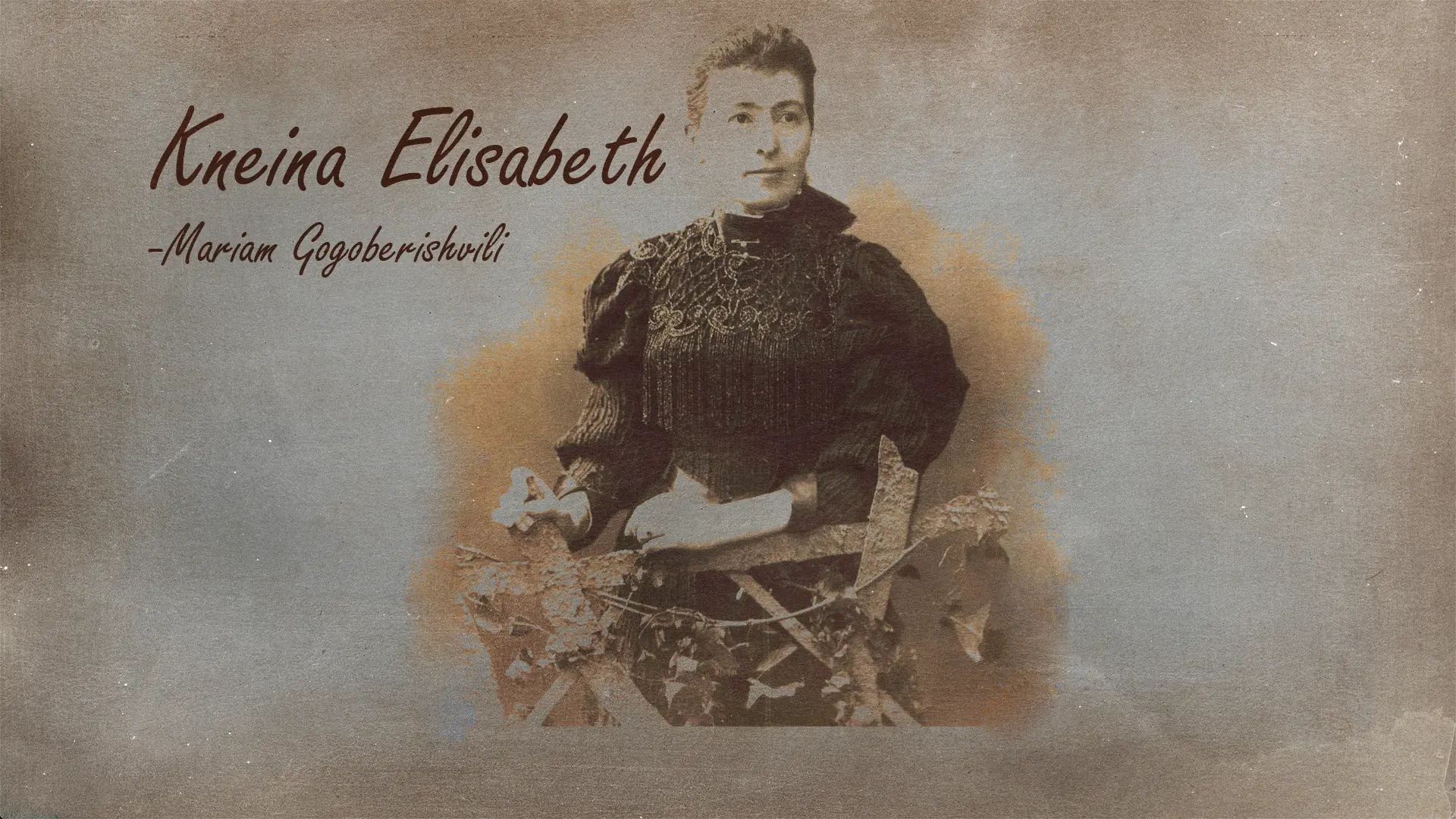
Author: Mariam Gogoberishvili
Discovery
For several days now, the name of this beautiful, but especially “charismatic” woman has been spinning in my head. Interestingly, more than ten years have passed since she last occupied my thoughts. Ten years ago, she interested me less, and later, I almost forgot about her. In the past year, however, my curiosity has reawakened, and I have a desire for everyone, if not many, to know about her.
Who was Elizabeth Tsulukidze-Tsereteli?
She was a woman who, today, would probably be very influential with her inner feminism, innovation, culture, and love of art. I’m looking for any information that will give me significant details to create her portrait.
Currently, Levan is painting a portrait of Elizabeth. He is also seeking to erase all the inaccurate lines and shadows from her face so that it remains true to how it really was. I also want to remove all the misconceptions about Elizabeth and tell the real story—how it began, continued, and ended. She was an incredibly interesting woman, much like many others from her time. Today’s individuals seem to lack the colorful intricacies, the lace and smiles, that adorned those before them.
Pomegranates
Elizabeth’s portrait on Levan’s canvas is vibrant, with a jet necklace around her neck. However, my newspaper article has stalled and “cannot take a single step.” There is, however, one step, a romantic one—pomegranates. It turns out that the courtyard of Elizabeth’s palace was filled with pomegranate trees. How beautiful they must have been in bloom! The mistress of the palace loved to view them from the balcony.
It is now four o’clock in the morning. I am reading the article “Memories of Elizabeth Tsereteli” from a 1990 issue of the Sachkhere newspaper for the umpteenth time. The memoirs, very interesting and depicting a wonderful lady with all her dignity, belong to her daughter-in-law Sonya Tsereteli-Avalishvili. I really want to share with you the full extent of the charitable and good deeds that would never have happened or would have happened too late without Elisabeth’s participation: the introduction of the railway in Sachkhere; renting a building for a hospital and opening the first hospital; constructing bridges connecting the city and villages; opening a school in her own home, post office and telegraph; issuing pensions, scholarships, or one-time assistance to many people. She made everyone happy, was a housewife, a caretaker of her own and other people’s orphans, strong-willed, proud, stubborn, but extremely kind, hardworking, and tireless in her work.
If all this seems like an exaggeration to you, then let’s quote the words of Arthur Leist, a famous German Kartvelologist and a trustworthy person: “She was a very sweet, hospitable, typical Georgian woman, to whom neighbors flocked—both rich and poor; As far as I remember, Elisabeth was the soul and heart of the whole Satseretlo, and indeed, with her attractive facial features, she left a pleasant impression on everyone…”
That’s it! This is your German, who assessed this great woman with these words after a short acquaintance! Did you notice that he says, “Typical Georgian”? When I read these words, I involuntarily straightened my shoulders. I was glad that in our recent past, along with many good things, the dignity of Georgian women stands like a precious crown on their heads!
How are you, dear Calbatono Elizabeth? I’ve already learned quite a lot about you. I also saw several photographs, including one in which you are sitting in a white robe, already in your old age, with gray hair. Surrounding you are people unknown to me, but probably close and dear to you. I especially like this photo because you have an expression of someone who has seen much in life. I’m not surprised. Everything is written on your face: tireless work, kindness, justice, early widowhood and the death of your daughter, pride, humility, and great wisdom.
I read in the memoirs of your daughter-in-law that you once asked a man from Sachkhere, who came to visit you in Tbilisi in the last years of your life: “Did I deserve this?” I understand you well; I understand your pain. Of course, you didn’t deserve it. Again, let me remind you of the memories of your stepson: he says that without you, there would have been no good initiative in Sachkhere, that any high or low official considered it obligatory to get to know you. Everyone was delighted with you. This is true! You truly deserve it and more.
You deserve the fact that today, less than a century since your passing, your magnificent palace with a lush pomegranate garden still stands proudly on one of the old streets of Sachkhere, like a remnant of its former glory. You deserve it, which is why your monument stands in the garden of the century-old railway station in Sachkhere, and why the bridge connecting the city and villages, built through your efforts, is called the “Elizabethan Bridge.” I love watching from this bridge as the clean and transparent Kvirila River runs under it. I chose one round and flat stone that has remained motionless in one place since my childhood, while the waves rolled and went around it more and more.
Good evening, Calbatono Elizabeth! Our conversations (or rather, my monologue with your photographs) have become more rare.
Alas, Mrs. Elizabeth, what a time it was when a kind man like Severian Chogoshvili visited the sick at home on his horse (probably so often that the horse itself knew which door to stop at), and Dzhibo Iashvili distributed medicines to the sick for free! In the library opened in the house of Ivan Gomarteli, little “students” leafed through treasured books. Residents of Sachkhere of different nationalities lived and worked side by side, and cheerful salon evenings took place in your palace…whoever visited you…
In Akaki’s house now stands your black piano, when you showed silent films, the wonderful Anton Grigalashvili accompanied on this piano. Akaki often visited you; he often composed improvisations, probably directed at the guests of the palace. Young Galaktion came to say thank you for helping him at an important moment. Whoever came…how many interesting things a person would understand and learn if someone thought up and wrote down those wonderful evenings—as proof of extraordinary times…


